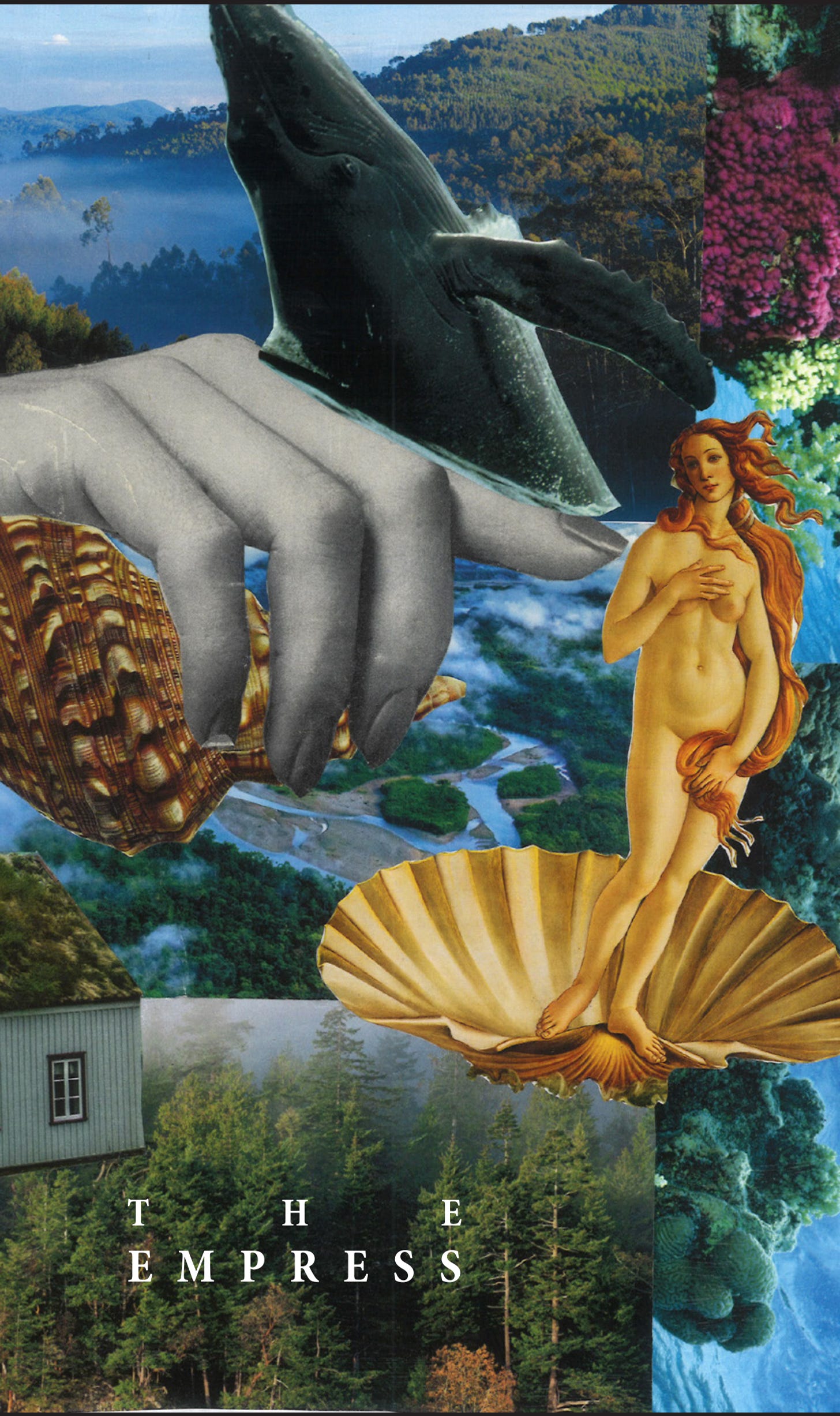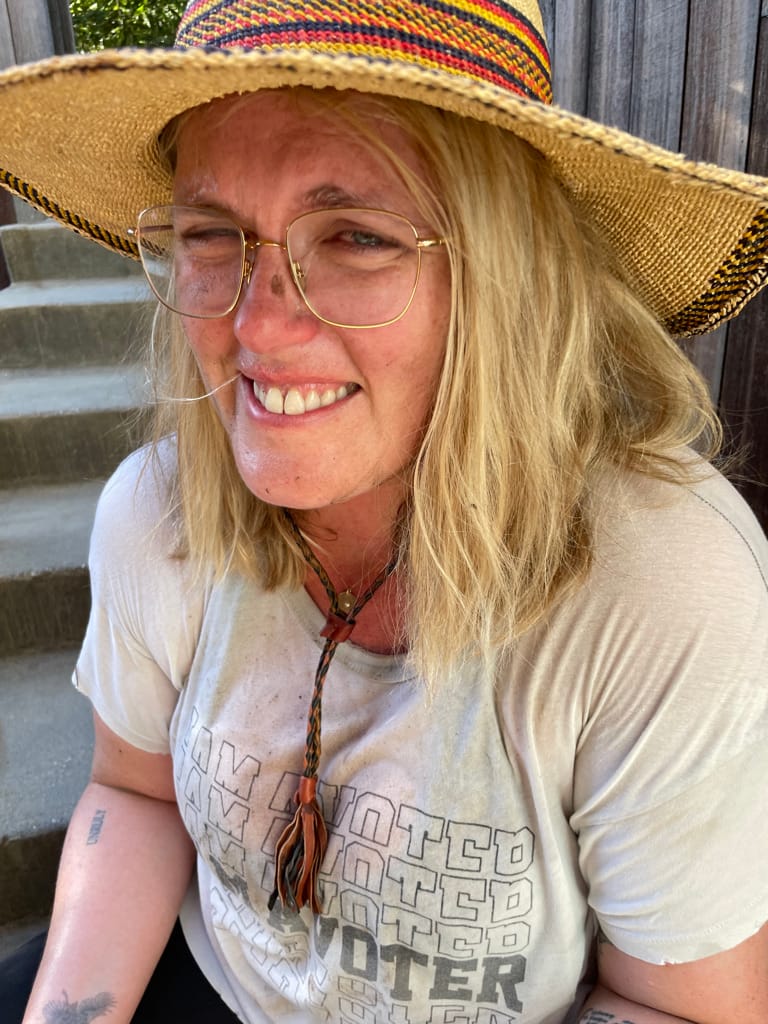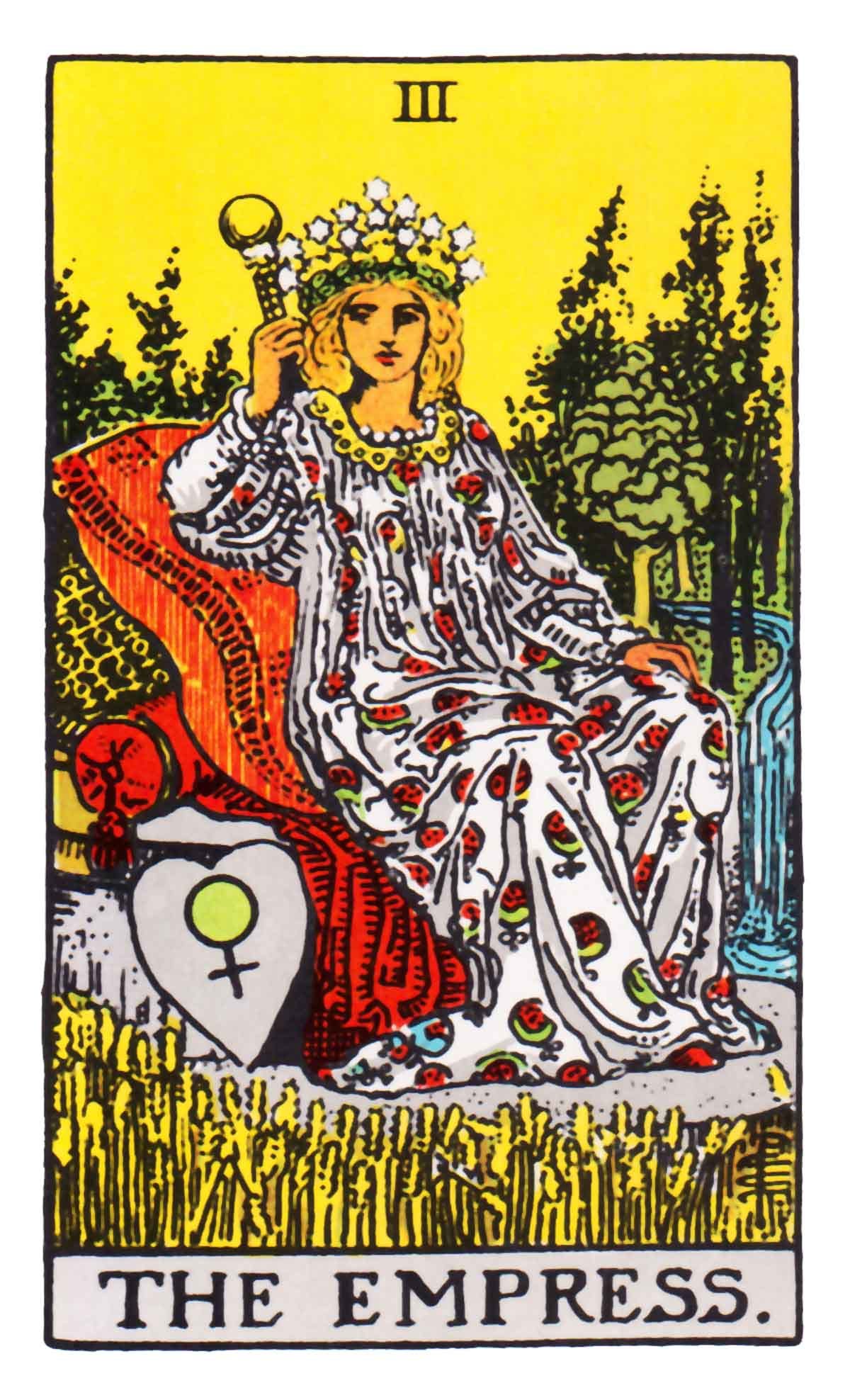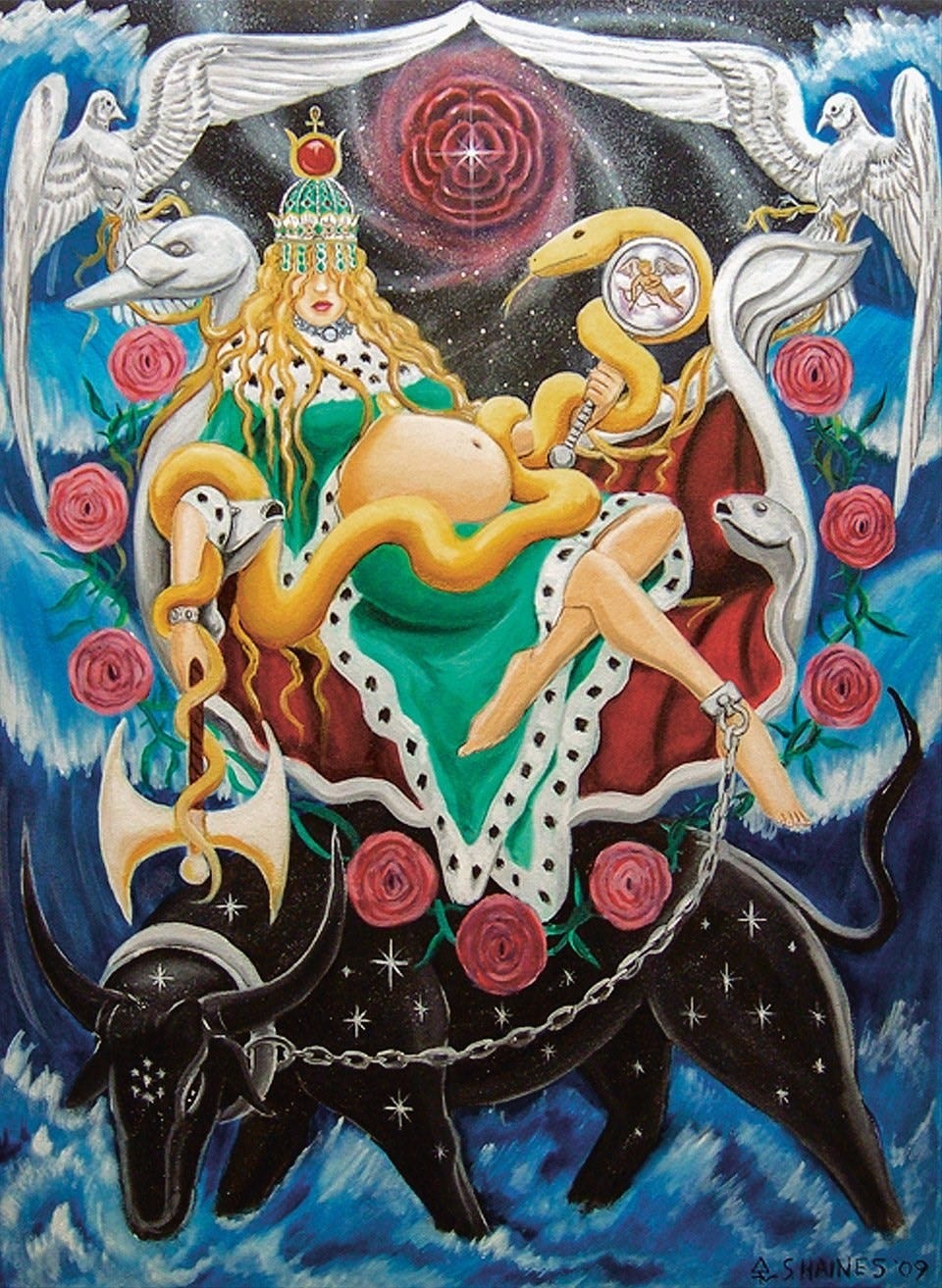The Empress
I am a proud perfectionist and overachiever, and I plan to wow this woman with my dedication to thinness. I’m ready for whatever restrictive diet she throws my way. I’ve been dieting since I was eleven years old, I’ve got this.

“The Empress is the cosmic mother, pregnant with life, ideas, and desires. Her feminine power is expressed in all forms, boundlessly sexual, creative, and nurturing. Her energy flows unbridled. She exudes abundance, beauty, and the glorious pleasures of the senses. She points to the exquisite splendor of the natural world, the sunlit leaf, the ink-black night. She rules over both the earth and the sky, she celebrates both the body and the mystic mind. She demands connection with and attention paid to the gifts of taste, touch, scent, and sound. She calls forth for joyous birth and evolution. Creation, in all its expressions — the child, the rosebud, the symphony — are all in her domain.”
- from The Library of Esoterica TAROT edited and written by Jessica Hundley

[Content warning: Disordered eating, diets, patriarchy, fatphobia]
I am sitting in the waiting room of a dietician’s office. Though I wasn’t asked to, I have kept a food journal religiously for weeks, and I’ve printed out the readings from my Whoop monitor (essentially a Fitbit) that records my heart rate and calculates how many calories I’ve burned. I am a proud perfectionist and overachiever, and I plan to wow this woman with my dedication to thinness. I’m ready for whatever restrictive diet she throws my way. I’ve been dieting since I was eleven years old, I’ve got this. Especially now that I am paying someone to keep me accountable.
Her name is Gloria and she has pink hair and a kind face. She looks like someone I would be friends with. I’m grateful that she “looks smart” (whatever that means). I sit down in her office and she asks me what has brought me here. I tell her about drinking, about gaining weight during COVID because I was stressed and show running and there was a global pandemic. I give all kinds of excuses, and I also tell her how much weight I’ve lost since I quit drinking to show her that I’m serious. I tell her, “I’m really good at dieting.” I shove over the food journal and the Whoop readings. She stares at them, remarking, “I don’t think anyone’s ever brought me a food journal unprompted before.” My chest fills with pride. She’s never met anyone more dedicated to punishment than me.
I do not leave Gloria’s office with a diet regimen… yet. Instead, she has asked me to read a book. I’m ready. I’ve read Suzanne Somers, Whole30, The Atkins diet, French Women Don’t Get Fat, and a zillion others. Not only will I read whatever book she throws at me, I’ll master it. I’ll come in next week with the rules memorized and implemented.
Instead, Gloria asks me what I know about “hygge.” I’ve seen Frozen on Broadway, and listened to the soundtrack approximately seven hundred and two times, so I know that it is the Danish word for coziness (I will not be putting the song on this week’s playlist for reasons I don’t think I should have to explain, but it’s linked above if you're a glutton for punishment). The book she is assigning me is The Little Book of Hygge: Danish Secrets to Happy Living by Meik Wiking. She tells me that it sounds like I’ve been punishing my body for a long time, and maybe I deserve a little warmth, a little coziness.
I feel two things simultaneously — the first is a bone deep recognition and relief; she sees something that I’m trying to hide — she sees how tired I am, how tired my body is, and how much I would like to be taken care of. The second thing I feel is fear; if this woman is going to try to get me to love myself, she’s got another thing coming. I’ll love myself when I’m good and ready, and today is not that day.
Listen, on the one hand, I “love” myself. In front of my children, I do my best. When my daughter asks me which of my stretch marks is my favorite, I do not throw up, scream, or burst into tears. Instead, I consider the question. I know she is searching my face, testing me, preparing for my answer to seep into her subconscious and inform how she feels about her own body for the rest of her life. I give her an answer by choosing the deepest stretch mark on my stomach — “this one, because it reminds me of what my body is capable of, and how it brought you into the world.” I’m proud of myself for hiding how hurt I am by the question. I’m proud of myself for giving the answer I’m supposed to give so that she will learn to love herself.

When my son asks why my belly is so squishy, or when in a temper tantrum he screams at me, “You’re fat!” I do not spontaneously combust from shame. I stand stalwart. I take it in stride. I am 38 years old and he is five. He is pushing boundaries, trying to hurt my feelings. After he’s calmed down I tell him, “Bodies come in many different shapes. I’ve been fat, I’ve been thin, and everything in between, and I’ve been beautiful the whole time.” I tell him that fat is not an insult. It’s a descriptive word, and should not be weaponized as an insult. Later, in bed, my husband and I are talking and I am trying to figure out why our baby would use “fat” as an insult — “Where did he even get that?” My husband looks at me like I’m crazy, “He’s a person in the world.” And, of course, he’s right. He is a person in a world that punishes bodies.
I tell my husband that our children need to see how much he loves me, and how beautiful he thinks I am. This is important for their development, so that they will become good people. I also need this, but I have a much harder time asking for it on my behalf. “Tell me I’m pretty so our children will have good self esteem and will grow up to be good people,” not “Please tell me I’m pretty because I can’t believe it unless it comes from someone else.”
I think there’s may be nothing less interesting than talking about diets. And yet, as I consider the Empress and how she shows up in my life, I’ve got to be honest about how out of touch with my body I have historically been. I am thirty eight years old when Gloria assigns me a book on hygge. I read it like a person who’s been starving and has just been fed (which, essentially, is what I am).
Each week, we untangle the thousands of competing rules I’ve internalized about food — no nuts, bananas, carrots, or sweet potatoes (Suzanne Somers “Somersize), no legumes, dairy, or soy (Whole30), no sugar, rice or pasta (Atkins), don’t work out, walk instead (French Women Don’t Get Fat), work out constantly (The Kardashians, The Biggest Loser). Eat bacon (Atkins), don’t eat bacon (the New York Times), eat foods in very specific combinations (Suzanne Somers), drinking is good for you (The New York Times, CNN), drinking is bad for you (The New York Times, CNN), only drink tequila (a trainer I used to go to), don’t calorie count (Whole30), count your "points" and if you want to have two glasses of wine you’ll have to make sure you don’t eat too much early in the day (Weight Watchers), eat avocados (Whole30), don’t eat avocados (Suzanne Somers), eat potatoes (Whole30), don’t eat potatoes (Suzanne Somers, Atkins), eat dairy (Atkins), don’t eat dairy (Whole30), eat leek-water soup for 48 straight hours (French Women Don’t Get Fat), drink smoothies and juices for seven days (Moon Juice, Master Cleanse), why would you need a snack when you can have this tasty chalk tablet (Isagenix), and on and on and on. Each rule comes with a conflicting opposite rule. If I get any of these wrong, it’s my fault. [You’re not getting any links for these books, because I do NOT recommend them]
I tell Gloria that I’m sure that dieting has wrecked my metabolism. She says, “Okay, let’s do a metabolic test.” I lie still for fifteen minutes and breathe into a tube. Not only is my metabolism working, it’s working better than average. Gloria tells me that I need to be eating a lot more than I am currently eating, that my body doesn’t believe I’m going to feed it. She suggests I take off the Whoop, because I need to be listening to my body, not a robot on my wrist. She reads me a powerpoint slide that she uses to teach middle schoolers about eating disorders — one of the signs of disordered eating is an over-dependence on devices, rather than your body’s internal cues. Begrudgingly, I take off the Whoop.
I also stop taking Adderall, which I have been taking for a few months to combat my recently-diagnosed ADHD. Adderall helped me focus, kept me on track and churning out material, but my favorite thing about it was how effectively it shrouded my hunger in productivity. I was never hungry, I was producing. I’m not saying that stimulant medications are bad, and I know that not only did Adderall help me, it helps a lot of people. I love psychiatric medicine and I’ll never apologize for that. Ultimately, though, in the case of me and my prickly relationship with my body, Adderall was a way to stay focused, stay hustling, and stay in a cycle of punishment.
I go on walks with my friend, Tamara, through our neighborhood some mornings when our kids have been dropped off at school. Tamara is a poet— beautiful, edgy, and cool. I cannot believe she likes me — she is effortless, thoughtful, British, with a bleached blond pixie cut. She’s read every book I’ve ever read and seven thousand more (though she's never a snob about it). She’s a beautiful writer, used to be in a band, and she and her husband sometimes go out dancing. I admire and adore her. On a recent walk, I tell her about Gloria, about the work I’m doing, about trying to listen to my body, trying not to think of it as a hideous meat sack that carries my brain around. Tamara tells me to replace the word “body” with “being.” “You would never say you hate your being, would you?”
One morning, Gloria, reads aloud to me a passage from The Wind In The Willows by Kenneth Grahame:
When the girl returned, some hours later, she carried a tray, with a cup of fragrant tea steaming on it; and a plate piled up with very hot buttered toast, cut thick, very brown on both sides, with the butter running through the holes in it in great golden drops, like honey from the honeycomb. The smell of that buttered toast simply talked to Toad, and with no uncertain voice; talked of warm kitchens, of breakfasts on bright frosty mornings, of cosy parlour firesides on winter evenings, when one's ramble was over and slippered feet were propped on the fender; of the purring of contented cats, and the twitter of sleepy canaries. Toad sat up on end once more, dried his eyes, sipped his tea and munched his toast, and soon began talking freely about himself, and the house he lived in, and his doings there, and how important he was, and what a lot his friends thought of him.
By the time she’s finished reading, both Gloria and I have tears in our eyes. Toast. Who knew? Gloria knows what I am beginning to understand — that food is a lot more than food, and bodies are a lot more than bodies. Food is an expression of love, a journey through memory, an adventure, a challenge. Food is ancestral magic, intuitive alchemy. Or it can be if you let it.
I wish I could say I’ve eaten a piece of toast without shame since then. I haven’t. I have a long ass way to go before I’ve embraced my inner Empress, the fecund, sensuous divine feminine goddess, who’s body is in alignment with her spirit, who would consider the stretch marks on her belly like rings on a tree — a map, her history, a story of who she is and where she’s been. The Empress would never fall prey to fatphobia, internal or otherwise. She would liberate herself from patriarchal, white supremacist beauty standards. She would own her beauty and her power. She would be a force of creativity and magic. Her body is not thin, it's expansive, voluptuous, voluminous, like an ocean or the universe. Her body is not a body, it’s her being, as intimately connected to her soul as her brain is.
A few months after I quit drinking, I take my first mushroom trip (California style temperance). My husband and I are in Big Sur, away from our kids, and I've been curious to try psilocybin for its magical and psychological benefits.
The experience is electrifying, life changing, pure magic. We hike through the woods, getting lost over and over again, as I stop every five feet to examine and make sweet love to each and every tree. I am overcome with a full range of emotions. I am also, for maybe the first time in my life, rooted deeply in my body. From deep within comes ancient knowledge that shame is performative, a defense, that it’s a prison of my own making. “I can choose to turn off shame!” I tell every tree in the forest.
My husband points out a road cutting through a mountain in the distance. “Someone made that,” he marvels. “And how dare they?” I reply.
The mountain is feminine, I know in my bones, and I am furious at whichever enterprising colonizer cut through her beauty to build his roads. I feel profoundly safe, cradled by the earth, unafraid of the future, unbothered by the past. For a brief moment, I am The Empress. My body is as beautiful as the trees in this wood. I hold a tiny pinecone in my hand and tears spring to my eyes as I am overwhelmed by its simple perfection and beauty.

“Everything is small when its mother’s looking at it,” I write in my notebook, in the big, wild handwriting of a person on mushrooms. I have always longed to be small, cared for. I’ve always felt wise beyond my years, grown up, self sufficient. I was a professional actor from the age of 6 months old on. At three, four, and five years old, I understood how to behave, how to take direction, how to ignore my body’s signals in favor of productivity (I wet my pants not once but twice on stage when I was starring in an Off-Broadway musical at age six).
Everything is small when its mother’s looking at it. I have been both daughter and mother. My body has stretched itself and shrunk itself and it has been punished and ignored for long enough.
There is an Empress inside of me. Everyone once in awhile, she gets in the driver’s seat and guides me toward gentleness, kindness, acceptance. I know she exists, and even if I’ve only felt her presence fleetingly, it’s only a matter of time before she breaks free. Once she gets out, it’s over for you hoes.


Book Recommendations:
The Little Book of Hygge: The Danish Way To Live Well by Meik Wiking
Fat Talk: Parenting In The Age of Diet Culture by Virginia Sole-Smith
What We Don’t Talk About When We Talk About Fat by Aubrey Gordon
Hunger: A Memoir of (my) Body by Roxanne Gay
The Body Is Not An Apology: The Power of Radical Self-Love by Sonya Renee Taylor
Salt Fat Acid Heat by Samin Nosrat
Home Cooking: A Writer In The Kitchen by Laurie Colwin
Podcast:
Maintenenance Phase with Aubrey Gordon and Michael Hobbes. Each week these brilliant journalists unpack the myths, history, and science (or lack thereof) of that week's fad diet.
